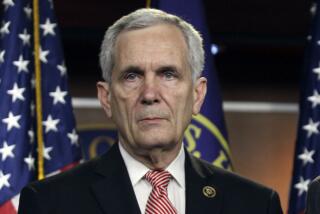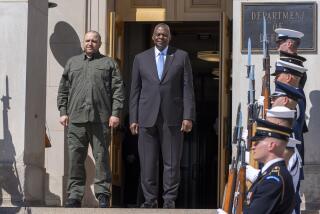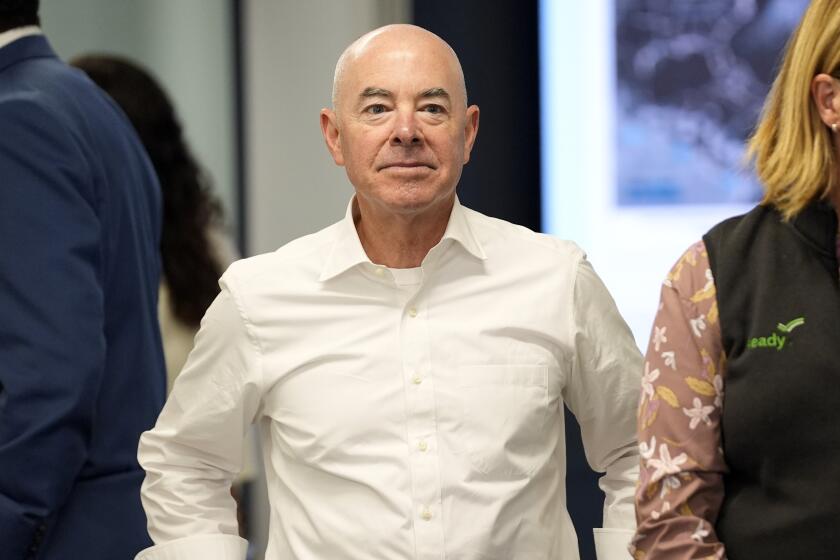Muslim Schoolgirl Scarves Banned; France in a Furor
In a move certain to enliven an already intense national debate over immigration and education, teachers at a public school in this industrial town north of Paris voted Monday to prevent Muslim girls from wearing head scarves to class.
The girls, two sisters, 14 and 15, and a companion, 14, were turned away from class on the first day of school after a weeklong holiday. They had arrived wearing the head coverings they say are required by their faith.
For the record:
12:00 a.m. Nov. 11, 1989 For the Record
Los Angeles Times Saturday November 11, 1989 Home Edition Part A Page 4 Column 1 Metro Desk 1 inches; 30 words Type of Material: Correction
Muslims--An article Nov. 7 inaccurately described Turkey as Europe’s only Muslim-majority nation. The population of Albania is believed to be about 70% Muslim, even though the country is officially atheist.
Principal Ernest Chenieres placed the girls in the school library and threatened to expel them if they continue to insist on wearing the scarves.
“Patience has its limits,” Chenieres said. “I will not permit these three young girls to continue to disrupt this school.”
According to Chenieres, the girls’ attire has emphasized religious differences in an ethnically charged atmosphere and could be interpreted as an attempt to convert others to their religion. French law forbids proselytizing in public schools.
Chenieres ignited the controversy three weeks ago when he outlawed head scarves at his junior high school, Gabriel Harvez College, where about half of the 873 students are children of Arab immigrants.
Since then, the incident has grown into a public debate in the intellectual community and among political parties, with the issue of religious freedom pitted against French laws separating church and state.
It has even divided families. Francois Mitterrand, the president of France, has not commented publicly on the issue, but he is believed to disagree with the position taken by his wife, Danielle, who supports the girls.
“If today, 200 years after the Revolution, the secular schools cannot welcome all religions in France, all forms of expression, that means there has been a setback,” the president’s wife said.
The debate touches directly on the sensitive relations between the native French and 3 million Arab immigrants, mostly from North Africa, who in the past 20 years have made Islam France’s second largest religion.
It parallels a heated dispute over the planned construction of a mosque in Lyon and another caused by the demolition in August of a small mosque in Charvieu-Chavagneux, near Grenoble. The demolition was ordered by a right-wing mayor affiliated with the National Front, the rightist party that opposes immigration.
A series of unsolved killings, including those of two ethnic Arab youths on Bastille Day, July 14, have added to the tension.
The scarves-in-school issue is regarded by some as a rare intellectual confrontation, one of the first since the 1984 feud over government aid to Catholic schools, which led to the fall of the first Socialist government.
The role of religion in public schools, similar to the issue of church-state separation in the United States, has been at the center of French political life for more than 200 years, beginning with fights between the minority Protestant population and the Roman Catholic majority. No other issue so inflames the French.
Until 1984, when the Socialist government finally agreed to fund private Catholic institutions as well as public schools, the religion-school debate was the central issue separating the right and the left in France.
“France is never as creative as it is during the middle of a good debate,” Creil’s Mayor Jean Anciant said the other day.
Serge July, the influential editor of the Paris daily Liberation, commented: “French society finally looks ripe for a real debate on North African immigration and its integration, a debate outside the pressure of elections. It is now or never.”
French officials had hoped that the mid-term school break would calm emotions on the volatile issue. Education Minister Lionel Jospin, who is considered a possible successor to Mitterrand in the Socialist Party, had appealed to school administrators to engage in “dialogue and persuasion” to prevent an open confrontation on the issue.
On Sunday, Jospin submitted the question of religiously oriented school attire to the French Council of State, but his hopes for a quiet resumption of classes disintegrated the following day when the 60 teachers at the Gabriel Harvez school voted to prevent the three girls, Fatima and Leila Achaboun and Samira Saidani, from attending classes.
The teachers said that if the girls attempted to attend class, they would walk out and take the other students with them.
At another school, in the Paris suburb of Poissy, teachers voted Monday to strike for two hours after one of their students arrived wearing a scarf. In France, the teachers’ committee at each school has the power of a trade union. Instant strikes are not uncommon.
Monday’s action was a victory for a group of French intellectuals that includes philosophers Regis Debray and Alain Finkielkraut and feminist-novelist Elisabeth Badinter, who had appealed to the teachers in the magazine Nouvel Observateur: “Teachers, don’t capitulate!”
Debray and the others subscribe to the strict separation of church and state embraced by French intellectuals since the dawn of the revolution in 1789.
The intellectuals are joined in the anti-scarf camp by former President Valery Giscard d’Estaing, former Prime Ministers Pierre Mauroy, Raymond Barre and Laurent Fabius, National Front leader Jean-Marie Le Pen, Defense Minister Jean-Pierre Chevenement and a prominent North African integration organization called France Plus.
One of the Socialist Party leaders on this side of the debate, Health Minister Claude Evin, challenged the conciliatory position taken by Education Minister Jospin and Prime Minister Michel Rocard.
Evin said in a radio broadcast that “wearing veils is a reduction of freedom.” He said it is the government’s responsibility to give this freedom to Muslim girls “who do not find it in their own family.”
Lining up with the girls and their families, along with Mitterrand’s wife, were several religious leaders, including the Roman Catholic Archbishop of Paris, Jean-Marie Lustiger, Rabbi Alain Goldman and Harlem Desir, the popular leader of the anti-racism organization SOS Racisme, which has strong links to the Socialist Party.
“Freedom will be more powerful than the forces of darkness,” Desir said Sunday night on a television program. “Blue jeans will eventually win over the head scarf. But banning things is to fall into a trap set by fundamentalism.”
Mohammed Mouhajer, who serves as spokesman for a fundamentalist Muslim organization called Voice of Islam and is a suspect in a series of terrorist bombings in Paris in 1986, had declared Monday a “day of trial” and urged Muslim schoolgirls to cover their heads.
“Wearing the veil does not in any way disturb secularism,” he said. “Schools are secular. People are not.”
Still, few girls heeded his call.
Ali Achaboun, the father of the two sisters who wore scarves to school Monday in Creil, said it was their decision, not his. Achaboun, an officeholder in the National Federation of Muslims in France, said he would help the school authorities in their effort to persuade his daughters to unveil.
“I will try again to convince my daughters, as I have from the beginning,” Achaboun said. “But all the same, I am not going to hit them or force them.”
FRANCE’S GROWING MUSLIM POPULATION A wave of immigration has made Islam the second largest religion in France, after Roman Catholicism. Most adherents come from Morocco, Algeria, Tunisia and Turkey.
The first three nations, all in North Africa, were formerly under French influence or control; Turkey is Europe’s only Muslim-majority nation. Many North Africans were recruited in the 1950s and 1960s to fill factory jobs. Statistics trace the explosive growth:
* In 1931, 90% of foreign nationals living in France were of European descent. In 1982, only 48% were Europeans and 39% were from North Africa.
* In 1971, there were 33 mosques in France. By 1985, there were 912.
* There were 3 million Muslims in France in 1982 (the last census), or about 5% of the 54-million population.
The Muslim arrivals have been greeted with less than open arms by some segments of French society. Immigrants have been blamed for crime, drugs and other social ills, and for diluting the “Frenchness” of the culture. Right-wing politicians such as Jean-Marie Le Pen have capitalized on these fears. But some liberals also worry that Muslim fundamentalism threatens France’s traditional separation of religion and state.
Source: Statistics provided by French Embassy in Washington, D.C.
More to Read
Start your day right
Sign up for Essential California for news, features and recommendations from the L.A. Times and beyond in your inbox six days a week.
You may occasionally receive promotional content from the Los Angeles Times.






